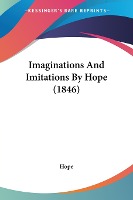""Imaginations and Imitations"" is a collection of poems written by the British poet and novelist, Hope, and published in 1846. The book contains a variety of poems, ranging from ballads and sonnets to longer narrative pieces. The poems explore a range of themes, including love, nature, and the human condition. Some of the poems are original works, while others are imitations of famous poets such as John Keats and William Wordsworth. The book is a testament to Hope's skill as a poet, as well as her ability to capture the essence of other poets' styles. Overall, ""Imaginations and Imitations"" is a must-read for lovers of poetry and those interested in the work of 19th-century British poets.This scarce antiquarian book is a facsimile reprint of the old original and may contain some imperfections such as library marks and notations. Because we believe this work is culturally important, we have made it available as part of our commitment for protecting, preserving, and promoting the world's literature in affordable, high quality, modern editions, that are true to their original work.

